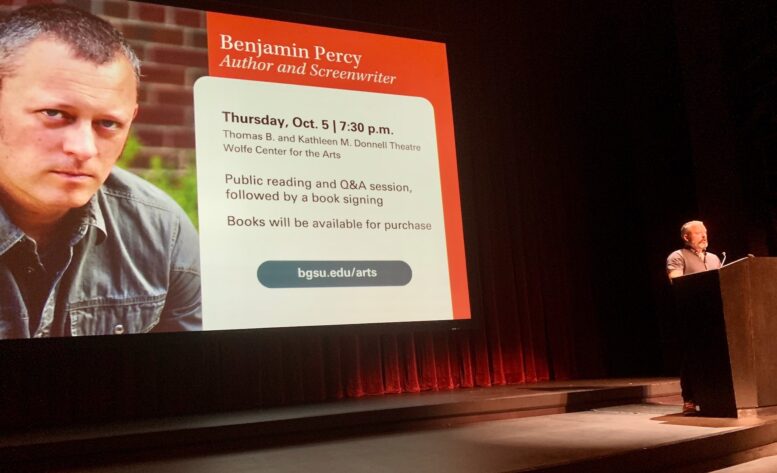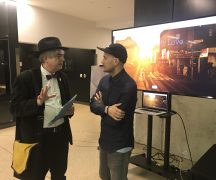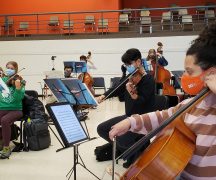By JULIE CARLE
BG Independent News
As a kid, Benjamin Percy had a voracious appetite for reading. He devoured comics and books about dragons, monsters and superheroes as he and his family spent most evenings sprawled across their living room reading their favorite genres.
He would turn the pages so swiftly, it made a breeze on his face, the acclaimed author and screenwriter told a crowd at Bowling Green State University’s Edwin H. Simmons Creative Minds lecture on Oct. 5.
“I was reading to answer the question, ‘What happens next?” he said in his deep, booming voice.
It wasn’t until he got to college that he learned literature encompasses so much more than ghosts dragons and vampires.
Percy was shocked to learn there would be no “genre readings” in his first creative writing course. He had never heard of Alice Munro, Leslie Silko or James Baldwin before his first creative writing course, but he quickly immersed himself in nothing but literary writers for the next five to seven years.
He became obsessed with the mechanics of writing, breaking down sentences and studying the taxonomy of great writers. “I was so obsessed with every technique and craft that I became emotionally detached from what I was reading,” Percy admitted.
A writing exercise that required him to think about what kind of stories he would write about growing up made him question if that was different from his current writing style. He also took to heart an essay by Eric Copland about the “planes of listening.”
The sensuous plane is where “you are in the coffee shop, drinking your syrupy, macchiato caramel latte. Nora Jones is singing through the loudspeakers and you are soothed, not paying attention to the lyrics,” he explained.
“This is how most people read. They just want escapism. They just want to go down a rabbit hole. They just want to know, ‘What happens next?’” He realized he was at the sensuous plane all by himself.
Percy compared the next plane—the expressive plane of music—to wondering why Led Zepplin has so many references to “The Lord of the Rings.”
“You lean forward into the lyrics. This is what happens when you become an English major,” he joked.
The third plane is composition, or what happens when you are “a true music nerd, where you can recognize every single instrument in a song, you can even imagine it as sheet music.” In writing, that would be a person who earned an MFA in creative writing. And that’s where he was, adding “there is absolutely nothing wrong with being at that stage and writing for others on that plane.
But he knew he wanted more. He wanted to occupy several planes at the same time.
“I wanted to be neither fish nor fowl, both literary and genre. And that’s the place that I became most interested in as a writer,” he said. “I wanted to write artistically substantive but compulsively readable.”
He listed a battery of authors’ names who weren’t stuck in one plane and he started to think about his own place in that space, where writers were having fun and occupying a space that was forbidden to him for several years.
And KABOOM. Two worlds collided for Benjamin Percy when he realized he could combine his dedication to the mechanics of writing with his devotion to his favorite genres.
With his writing prowess, he has engineered his career in many directions from short stories and novels to scripted podcasts and films, even writing in his childhood genre—comic books for both Marvel and Detective Comics (D.C).
He started writing comic books in 2014 when he wrote two Batman issues for D.C. Those led to writing for franchises that include James. Bond, Teen Titans, Green Arrow and Night Wing. He currently writes Wolverine, Ghost Rider and X-Force comics for Marvel, which contributed to his career as a novelist.
What he loved about comic books as a kid—and why he can remember his first comic book (Marvel’s The Man-Thing), but not his first novel that he read—goes beyond the heroism and the escapism.
“You could read Batman and be sated by this individual, but you could also read Wonder Woman, the Green Lantern and Superman and they were all part of this interwoven narrative tapestry,” he nostalgically described.
After writing Wolverine for five years and the other comic book characters he wrote about, Percy realized, “Those characters don’t belong to me.” He wanted to “build my own sandbox and make it infinitely generative.”
While he has written for comics, films, audio drama, and a craft book that is used in creative writing classrooms, including at BGSU, his latest iteration in writing is his own constructed universe. He created “The Comet Cycle,” a universe that currently comes alive in three books, ”that could become six or 12 or 20 books,” he said.
They include “The Ninth Metal,” “The Unfamiliar Garden“ and the most recently published “The Sky Vault,” which he read excerpts from during his talk.
As part of his reading, he pointed out the characters in literary realism are substantial. “You may know them better than you know your neighbors and friends. Those sentences are exquisite. But nothing happened,” he said.
Comparing genre fiction, he said, “The plot may be formulaic, and the prose might be considered pedestrian, but it never forgets that all six cylinders have to be blazing. And it never forgets about that kid on the living room floor who was turning the pages quickly to see what happens next.”





